Lucid November 2015 Newsletter
- Lucid Player Update
- Fact Sheet Fusion Updated
- Identic@Berlin
- Lucid user profile
- Lucid3 & Fact Sheet Fusion v2 Combo Special
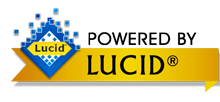 Lucid Player Update
Lucid Player Update
Recently the latest edition of Chrome removed the Netscape Plugin API (NPAPI) architecture that Java requires to function.
To enable the Java Applet based Lucid Player to work under Chrome, we have now updated it to support Java Web Start technology. What this means is if a key is accessed via Chrome, rather than loading directly inside the browser window, the Player will be launched as a separate application. All of the downloading of the Player and key data is handled automatically. The end user will not have to make any additional configuration changes for this to run. In order to deal with this Chrome problem for your users, we have updated the Lucid Builder with this newly updated Player. To update your existing Java Applet based keys download the latest Builder and redeploy your key.
JavaScript Lucid Player coming soon!
In the near future we will have a brand new Lucid Player that will no longer rely on Java. This new implementation will be entirely JavaScript based and will load directly in the web browser - no add-ons or plug-ins needed! It will also be capable of running from a HDD, USB, CD/DVD. Watch this space.
 Fact Sheet Fusion Updated
Fact Sheet Fusion Updated
Fact Sheet Fusion v2.0.4.830 has now been released and is available to download from www.lucidcentral.org for registered users or to trial.
This update includes enhancements to the Global Find and Replace feature that allows in place editing of the search results and a minor bug fix when importing older v1 fusion databases.
Read more about this release or how Fact Sheet Fusion can speed up your key development click here.
 Identic@Berlin
Identic@Berlin
At the recent International Plant Protection Congress held
in Berlin, August 2015, Geoff Norton presented a paper on
behalf of the Identic team entitled “Digital technologies
for diagnosis of insect pest, disease and weed problems”.
This PowerPoint presentation, which can be viewed as a pdf
file here![]() (4MB), shows how
digital technologies, such as Lucid keys and Lucid Mobile
apps, are complementing alternative means of providing
support to the identification and diagnosis of pest and crop
problems: examples include smart phone apps for weed
identification and for the diagnosis of crop problems in
rice in SE Asia and field crops in Western Australia.
(4MB), shows how
digital technologies, such as Lucid keys and Lucid Mobile
apps, are complementing alternative means of providing
support to the identification and diagnosis of pest and crop
problems: examples include smart phone apps for weed
identification and for the diagnosis of crop problems in
rice in SE Asia and field crops in Western Australia.
Another speaker in the same session – Dr Terrence Walters – talked about the strategy of the Identification Technology Program of the USDA, which utilises a range of digital technologies, including Lucid and Lucid Mobile, to provide support to users in the USA, ranging from quarantine inspectors at various points of entry to those concerned with pest surveillance in the field. A brief description of the ITP program can be viewed further below.
Lucid user profile
 The
Identification Technology Program (ITP) in the USA –
developing digital identification and diagnostic tools for
biosecurity and plant protection.
The
Identification Technology Program (ITP) in the USA –
developing digital identification and diagnostic tools for
biosecurity and plant protection.
This is the first of a series of profiles we plan to include in subsequent Newsletters
The US Department of Agriculture (USDA) established the ITP almost 10 years ago. Its purpose - to develop digital identification aids and tools primarily for use by staff in the USDA Animal and Plant Inspection Service (APHIS). Since these tools are freely available on the web and as mobile apps (go to (www.idtools.org), they can be used by other individuals and agencies involved in biosecurity, plant protection, taxonomy, and education, both within and beyond the USA.
Based in Fort Collins in Colorado, the ITP team responds to requests for improved diagnostic tools from various agencies within USDA; prepares proposals, seeks funding, contacts appropriate content experts, and provides overall management support for the development and deployment of the final product.
Initially the focus was on the development of
identification aids for taxa containing important pest
groups and species, particularly insect pests and weeds
posing threats to USA agriculture and natural resources. 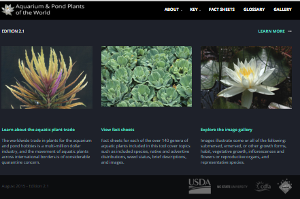
For instance, an identification key was developed for aquarium and
pond plants of the world – including those species
responsible for the worst aquatic weed problems.

Another early key, recently updated, is Flat Mites
of the World – a tool designed to help identify any
flat mite to genus, and in some cases to species, without
the need for expertise in the taxonomic group.
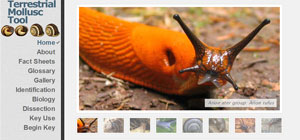
A review of the ITP Lucid Mobile key to terrestrial molluscs
has recently appeared on the US Government site –
DIGITALGOV.
More recently, diagnostic tools have been developed for
plant disorders, such as those found in citrus and palms,
using the same Lucid key system (www.lucidcentral.org).
The following table shows the top 5 ITP Lucid based
Internet tools being used internationally over 6 months from
January to June 2015.
| Tool Name |
Non U.S. |
Top five countries |
|---|---|---|
| Citrus Diseases |
23,522 |
Australia, India, United Kingdom, New
Zealand, and South Africa |
| Citrus ID |
8,762 |
Australia, India, France,
Czechoslovakia, and Spain |
| Terrestrial Molluscs |
8,153 |
United Kingdom, Canada, Australia,
France, and Germany |
| Citrus Pests |
7,614 |
Australia, India, South Africa, United
Kingdom, and Canada |
| AphidID | 6,330 |
United Kingdom, India, Germany, Greece,
and France |
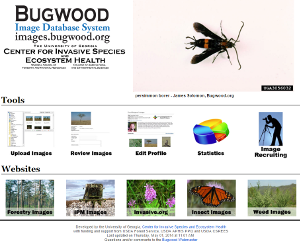
Good images are extremely important for confirming correct
identification and diagnosis, and the ITP, in collaboration
with the Bugwood team at The University of Georgia in the USA, has
developed a node to an image database that enables users to
filter images relevant to their specific crop and pest
problems. The image database is also being linked to Lucid
keys to provide integrated identification and diagnostic
tools.
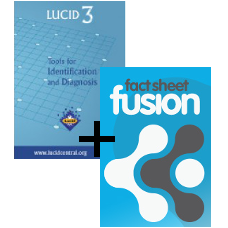 Lucid and Fact Sheet Fusion Combo special - 20% off
Lucid and Fact Sheet Fusion Combo special - 20% off
Purchase both Lucid and Fact Sheet Fusion together and receive a 20% discount!
Click here to take advantage of the offer.
For our overseas customers it's never been a better time to purchase Lucid and Fact Sheet Fusion with the current exchange rate!